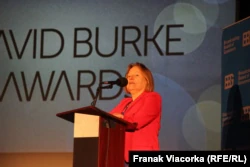The Senate Foreign Relations Committee is holding a hearing Tuesday for President Joe Biden’s pick to lead the U.S. Agency for Global Media.
Biden in November 2021 nominated former Voice of America director Amanda Bennett to run USAGM.
As head of the agency, Bennett would oversee an annual budget of $840 million and the running of six entities including the independent news networks VOA, Radio Free Europe/Radio Liberty, Radio Free Asia, Office of Cuba Broadcasting, Middle East Broadcasting Networks and the Open Technology Foundation.
Former VOA director of programming Kelu Chao currently holds the position in an acting authority. She was assigned the position after Michael Pack, the last presidential appointee, resigned at Biden’s request.
The role of USAGM chief executive was created with legislation during the administration of President Barack Obama as a way to make the agency more effective and efficient. The first person appointed to the role was conservative filmmaker Pack.
But Pack’s tenure was tumultuous, drawing criticism from Republicans and Democrats in Congress. It also led to several whistleblower complaints, an order from the Office of Special Counsel to investigate allegations of mismanagement, and separate court orders barring him and his aides from interfering in VOA editorial decisions or installing appointees at the Open Technology Fund, respectively.
Chao testified in the lawsuit alleging editorial interference, and lawmakers in 2020 revised the agency head’s powers after bi-partisan criticism of how Pack interpreted the role.
Bennett has prior experience at USAGM, where she was VOA director from 2016 to June 2020, resigning just before Pack took over.
The Pulitzer prize-winning journalist has a long career in U.S. media, including as executive editor at Bloomberg News and managing editor of The Oregonian newspaper. She was a reporter for the Wall Street Journal for more than two decades, including in Beijing.
In 2019 the National Press Club awarded Bennett its Fourth Estate award for significant contributions to American journalism.
In her acceptance speech, Bennett spoke of the role VOA plays in providing uncensored news around the world and underscored that the network is independent and not a government mouthpiece.
“We don’t do propaganda. And God willing, we never will,” she said in her remarks.
VOA’s public relations website says that under Bennett, the network’s weekly audience grew by around 109 million, and she oversaw more coverage of women and refugees, expansions to include a technology beat, investigative journalism unit, the fact-checking team Polygraph and dedicated press freedom coverage.
Critics however have said Bennett allowed VOA’s news coverage to become “soft” on China including during the coronavirus pandemic, citing a story about Beijing’s offer for personal protective equipment and medical supplies. Others, in columns for Washington newspapers, note that the agency scored poorly on staff satisfaction during her time.
Critics also question Bennett’s decisions to cut short a live interview broadcast by the network’s Mandarin service with a prominent critic of Beijing, and to dismiss Mandarin Service head Sasha Gong and others over the incident.
Gong at the time claimed VOA was pressured by Beijing to cut the interview.
Bennett disputed that, saying in a statement to staff the actions were “the result of VOA leadership’s attempt to enforce previously agreed-upon journalistic standards. The investigations found no evidence to support allegations that pressure from the Chinese government, purportedly driven by ‘spies’ within VOA, had caused the termination.”
As head of USAGM, Bennett would oversee the agency at a critical time, with its journalists under pressure or restricted in countries including Russia, Belarus, Iran and China.
Supporters of Bennett say her experience in foreign journalism makes her suited for the role.
Ambassador Karen Kornbluh, a former member of the USAGM’s governing board, told VOA that Bennett’s media background and knowledge of USAGM from her time as VOA director make her a strong candidate. She said Bennett could set “the standard for all who follow.”
“Her leadership is essential at a time of resurgent authoritarianism around the world — to ensure that people living under repressive regimes not only have access to accurate information but also can see models of excellent journalism in practice.”
Senator Jeanne Shaheen, a Democrat from New Hampshire, was due to preside over Tuesday’s nomination hearing with Senator John Barrasso, a Republican from Wyoming, as co-chair.
Committee hearings for presidential nominees take place after a White House vetting process. Candidates are also investigated by the FBI, IRS and Office of Government Ethics.
During nomination hearings, senators question the candidate to determine their suitability for the position and seek evidence of partisanship. The committee members eventually vote on whether to recommend the nominee for consideration by the full Senate.

